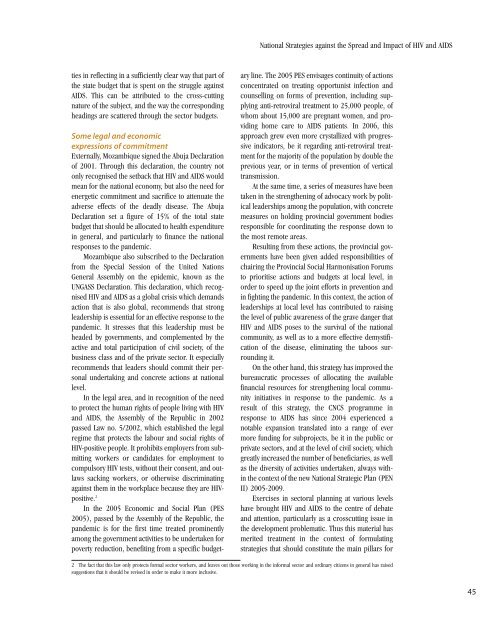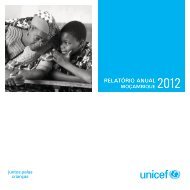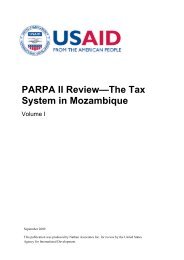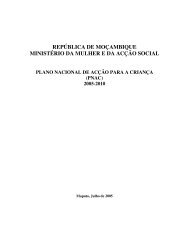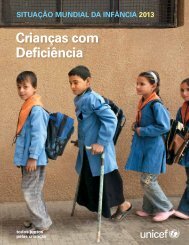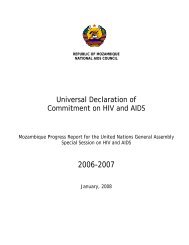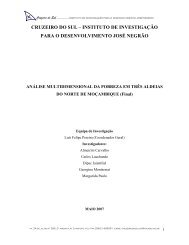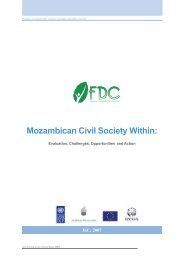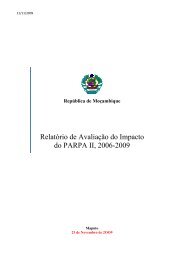Mozambique National <strong>Human</strong> <strong>Development</strong> Report 2007Box 7.1 Let’s speak openly in our families: President Armando Emílio Guebuza 1I want to talk with you, but particularly I would like to learn fromyou. I don’t bring clear ideas, but I am bringing clear concerns.How do we deal with this problem? I too don’t know!For we’ve been waging campaigns for years against HIVand AIDS on television, on radio, in the papers, at meetings,through song, through theatre and other forms of communication.Everywhere we say: let’s be careful, let’s reduce our numberof partners, let’s have more responsible behaviour, but thenumber of people infected with HIV and AIDS is increasing, it’sgradually increasing... And that’s why I say I don’t understand! Idon’t understand! I’m here so that, together with the leadingfigures who are with me, we can try to understand.What can we do? I believe none of us here knows everything,but I believe that if each of us were to say what he or shethinks about this, it’s going to help solve the problem. In thiscontext, I’m making an appeal to the secretaries, to the traditionalchiefs, to the teachers, to the doctors, to the businesspeople. I’m making an appeal: Bring your concerns for debate.Let’s talk openly to solve this problem!Ten years ago, when HIV and AIDS were talked about,nobody believed it. They didn’t believe in the existence of HIVand AIDS. Today, 10 years later, we now see many people sickwith AIDS. I’m not talking about those people we see and don’trealise they’re infected with HIV, but we’ve already seen manyAIDS patients, many people have died of AIDS, and in this countryof ours we have zones, regions, settlements where there areno youths. We only find children and old people. There’snobody in between. It’s the grandparents who look after thechildren.So I ask: will the message we transmit reach the peoplehere in the countryside properly? Do parents speak easilywith their children about this problem? Do young people, ourchildren, ask us without fear about what they can do andwhat they shouldn’t do? In our homes, do the cultural valueswe bear within us allow us to pass on information on sexualityand behaviour, which is what is missing? Why does thishappen? Why does the number of cases of the disease go onrising?Why is this the case now, when it’s not like it was someyears ago, when we heard that somebody died of AIDS, but wedidn’t know where this person came from? We didn’t knowwhat village this person lived in. But today all families havesomeone who died of AIDS or have someone sick with AIDS,What is preventing us from communicating properly with eachother?We have to halt this pandemic. The solution is in our hands,in our will. Let’s speak openly to solve this problem.There are no “orphans” in our traditionChildren in our communities have no lack of fathers or mothers.Those who are regarded as “uncles” or “aunts” in the nuclearfamily are considered, in our tradition, as father and mother.Children become orphans. They lose their parents. But inour tradition, and I speak from my own experience of where Igrew up, the concept of orphan does not exist. And I think thatthis part of our tradition should be recovered, valued and practised.When I was a child, I and the children of my uncles regardedourselves as brothers and not cousins. We treated everybodyas father and mother. That’s why it was sometimes saidthat x and y are brothers from the same womb. Wasn’t it likethat ?!I’ll tell you a personal story. My father scarcely knew hisown parents. I didn’t know my grandparents, and my fathergrew up in his uncle’s house. He was treated as a son.Coincidentally my mother had the same experience. I didn’tknow my mother’s mother. Or her father. She also grew up in anuncle’s house, and was never discriminated against. Whenevershe meets her cousins, she is regarded as a sister and not as acousin. She grew up in this environment, which is a good partof our tradition.There are no orphans! If the parents die, somebody elselooks after them as though they were their own children!No to discrimination and to stigmaIn Mozambique there are now many orphanages. It’s even saidthat these are orphanages whose parents have died of AIDS.Today, why are we talking about orphans whose parentshave died because of AIDS? Generally we say that this child’sfather died of AIDS. And we’re marking the child. He or she is adifferent child. And even in orphanages, we have orphanagesfor children who are orphans because their parents died ofAIDS. But there are other children who don’t have parents,whose parents have died, and they’re suffering too. They aren’tsupported, or they grow up differently. And again I ask: What iswrong in our society? Why aren’t we managing to halt AIDS?This is the question! My brothers: Let’s open up our hearts andspeak openly.We came here without answers, but above all we want yourcontributions. Your contributions can help us define policiesthat can lower, reduce the level of infections. We want communitiesto be able to find, at the most varied levels, answers tothis question, and that the responsibility for fighting AIDSshould not be attributed exclusively to the government. I thinkthat all of us, from the individual to the family, to the neighbourhood,to the locality, to the school, we all have an answerto give to this pandemic that is threatening our future.HIV and AIDS can be fought against. The current AIDS situationcan change, it can be beaten. Yes, it has no cure, but muchmore can be done, so that it doesn’t make people suffer somuch. For this, it is enough to be determined, for us to believethat we can make a difference, by each of us changing our attitudes,being frank with ourselves, all of us working on this linein the same direction.1 Extracts from the dialogue held by the President of the Republic, Armando Emílio Guebuza, with community leaders in the “3rd February” village, in Manhiça district, Maputo province,on 1 December 2005, the International Day for the fight against HIV and AIDS. This meeting opened a series of activities, headed personally by the Head of State, throughout 2006, knownas the “Presidential Initiative in the Fight against HIV and AIDS”.44
National Strategies against the Spread and Impact of HIV and AIDSties in reflecting in a sufficiently clear way that part ofthe state budget that is spent on the struggle againstAIDS. This can be attributed to the cross-cuttingnature of the subject, and the way the correspondingheadings are scattered through the sector budgets.Some legal and economicexpressions of commitmentExternally, Mozambique signed the Abuja Declarationof 2001. Through this declaration, the country notonly recognised the setback that HIV and AIDS wouldmean for the national economy, but also the need forenergetic commitment and sacrifice to attenuate theadverse effects of the deadly disease. The AbujaDeclaration set a figure of 15% of the total statebudget that should be allocated to health expenditurein general, and particularly to finance the nationalresponses to the pandemic.Mozambique also subscribed to the Declarationfrom the Special Session of the <strong>United</strong> NationsGeneral Assembly on the epidemic, known as theUNGASS Declaration. This declaration, which recognisedHIV and AIDS as a global crisis which demandsaction that is also global, recommends that strongleadership is essential for an effective response to thepandemic. It stresses that this leadership must beheaded by governments, and complemented by theactive and total participation of civil society, of thebusiness class and of the private sector. It especiallyrecommends that leaders should commit their personalundertaking and concrete actions at nationallevel.In the legal area, and in recognition of the needto protect the human rights of people living with HIVand AIDS, the Assembly of the Republic in 2002passed Law no. 5/2002, which established the legalregime that protects the labour and social rights ofHIV-positive people. It prohibits employers from submittingworkers or candidates for employment tocompulsory HIV tests, without their consent, and outlawssacking workers, or otherwise discriminatingagainst them in the workplace because they are HIVpositive.2In the 2005 Economic and Social Plan (PES2005), passed by the Assembly of the Republic, thepandemic is for the first time treated prominentlyamong the government activities to be undertaken forpoverty reduction, benefiting from a specific budget-ary line. The 2005 PES envisages continuity of actionsconcentrated on treating opportunist infection andcounselling on forms of prevention, including supplyinganti-retroviral treatment to 25,000 people, ofwhom about 15,000 are pregnant women, and providinghome care to AIDS patients. In 2006, thisapproach grew even more crystallized with progressiveindicators, be it regarding anti-retroviral treatmentfor the majority of the population by double theprevious year, or in terms of prevention of verticaltransmission.At the same time, a series of measures have beentaken in the strengthening of advocacy work by politicalleaderships among the population, with concretemeasures on holding provincial government bodiesresponsible for coordinating the response down tothe most remote areas.Resulting from these actions, the provincial governmentshave been given added responsibilities ofchairing the Provincial Social Harmonisation Forumsto prioritise actions and budgets at local level, inorder to speed up the joint efforts in prevention andin fighting the pandemic. In this context, the action ofleaderships at local level has contributed to raisingthe level of public awareness of the grave danger thatHIV and AIDS poses to the survival of the nationalcommunity, as well as to a more effective demystificationof the disease, eliminating the taboos surroundingit.On the other hand, this strategy has improved thebureaucratic processes of allocating the availablefinancial resources for strengthening local communityinitiatives in response to the pandemic. As aresult of this strategy, the CNCS programme inresponse to AIDS has since 2004 experienced anotable expansion translated into a range of evermore funding for subprojects, be it in the public orprivate sectors, and at the level of civil society, whichgreatly increased the number of beneficiaries, as wellas the diversity of activities undertaken, always withinthe context of the new National Strategic Plan (PENII) 2005-2009.Exercises in sectoral planning at various levelshave brought HIV and AIDS to the centre of debateand attention, particularly as a crosscutting issue inthe development problematic. Thus this material hasmerited treatment in the context of formulatingstrategies that should constitute the main pillars for2 The fact that this law only protects formal sector workers, and leaves out those working in the informal sector and ordinary citizens in general has raisedsuggestions that it should be revised in order to make it more inclusive.45


